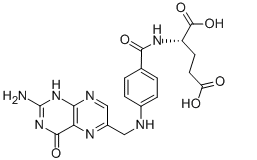Folic acid
| CAS No. | 59-30-3 | Cat. No. | BCP15305 |
| Name | Folic acid | ||
| Synonyms | Vitamin B11; Vitamin B9; Vitamin Bc; Vitamin Be; Vitamin M; | ||
| Formula | C19H19N7O6 | M. Wt | 441.4 |
| Description | Folic acid, also known as Vitamin B9, is a B vitamin. Folic acid is made and used in fortified foods and supplements on the theory that it is converted into folate. However, folic acid is an oxidized form, not significantly found in fresh natural foods. To be used it must be converted to tetrahydrofolate (tetrahydrofolic acid) by dihydrofolate reductase (DHFR). Vitamin B9 is essential for numerous bodily functions. Humans cannot make folates; therefore, folic acid has to be supplied through the diet to meet their daily requirements. The human body needs folate to make DNA, repair DNA, and methylate DNA as well as to act as a cofactor in certain biological reactions. It is especially important in aiding rapid cell division and growth, such as in infancy and pregnancy. Children and adults both require folate to produce healthy red blood cells and prevent anemia. | ||
| Pathways | Cell Cycle/DNA Damage | ||
| Targets | DNA/RNA Synthesis | ||
Structure

Part data of this page collected from the open network resources, so Biochempartner can not guarantee its accuracy.
For product details of different batches, please contact our Customer
- Service & Tech Support:orders@biochempartner.com
- Website:www.biochempartner.com
Products are for research use only and not for human use. We do not sell to patients.
